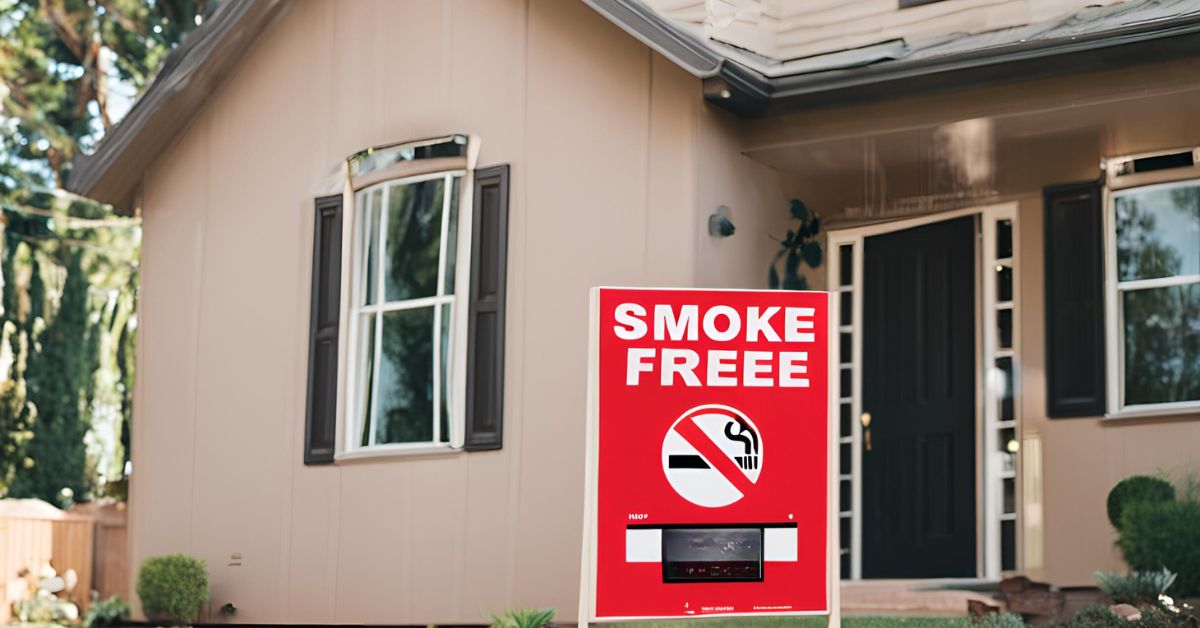As landlords and property owners, it's essential to consider strategies that not only enhance property value but also prioritize tenant well-being. Smoke-free rental properties bring advantages and help you elevate your property portfolio.
The Benefits of Smoke-Free Rental Properties
Smoke-free rental properties offer landlords and property owners a multitude of advantages that contribute to tenant satisfaction, property maintenance, and overall value.
.jpg)
Enhanced Tenant Satisfaction:
Non-smoking tenants, constituting the majority of the rental market, often prefer smoke-free environments due to health concerns and personal preferences. By providing a smoke-free living space, landlords can attract and retain tenants more effectively, leading to lower vacancy rates and increased tenant longevity.
Reduced Maintenance Costs:
Smoke-free rental properties typically experience lower maintenance costs compared to properties where smoking is permitted. Smoking indoors can lead to lingering odors, stains on walls and ceilings, and damage to fixtures and furnishings. By prohibiting smoking, landlords can mitigate these issues and reduce the need for costly repairs and renovations between tenancies.
Promotion of Healthier Living:
Creating a smoke-free rental environment promotes a healthier living space for tenants by eliminating the health hazards associated with secondhand smoke exposure. This fosters a safer and more comfortable environment for all occupants, contributing to their overall well-being.
Maximizing Property Value with Smoke-Free Rentals
In addition to the immediate benefits of tenant satisfaction and property maintenance, smoke-free rentals can also have a positive impact on property value and long-term investment returns.

Enhanced Marketability:
Smoke-free rental properties are highly marketable to a wide range of tenants, including families, professionals, and individuals with health concerns. The appeal of a smoke-free environment can attract a larger pool of prospective tenants, reducing vacancy rates and maximizing rental income potential. Additionally, smoke-free properties may command higher rents compared to similar properties that allow smoking, further increasing rental yields for landlords.
Property Condition:
By prohibiting smoking indoors, landlords can preserve the condition and cleanliness of their rental properties. Smoke-free environments are less prone to the odors, stains, and damage associated with smoking, resulting in properties that maintain their aesthetic appeal and value over time. This can translate into higher property appraisals and increased resale value, providing landlords with a greater return on their investment.
Positive Community Impact:
Smoke-free rental properties contribute to a healthier and more vibrant community by reducing exposure to secondhand smoke and promoting a culture of wellness. Landlords who prioritize smoke-free environments demonstrate their commitment to the well-being of their tenants and the broader community, which can enhance their reputation and attract quality tenants and investors.
Understanding Smoke-Free Rental Policies
Implementing a smoke-free rental policy requires careful consideration and clear communication to ensure compliance and tenant understanding.

Policy Development:
When establishing a smoke-free rental policy, landlords should clearly outline the scope and restrictions of the policy in the lease agreement. This includes defining prohibited smoking areas, such as indoor spaces, balconies, and common areas, as well as specifying any consequences for violations, such as fines or lease termination. Additionally, landlords may consider consulting legal counsel to ensure that the policy is compliant with local laws and regulations.
Communicating the Policy:
Effective communication is key to ensuring tenant understanding and compliance with the smoke-free policy. Landlords should clearly communicate the policy to prospective tenants during the leasing process and provide written documentation of the policy in the lease agreement. Additionally, landlords may use signage and other communication tools to remind tenants of the policy and reinforce expectations regarding smoke-free living.
Enforcement and Resolution:
Landlords should establish procedures for enforcing the smoke-free policy and addressing violations in a timely and consistent manner. This may include conducting regular inspections of rental properties to monitor compliance, responding promptly to tenant complaints or concerns related to smoking, and imposing appropriate penalties for violations, as outlined in the lease agreement. Additionally, landlords should be prepared to address any disputes or conflicts that may arise from the enforcement of the policy, using mediation or legal channels as needed.
Conclusion:
In conclusion, embracing smoke-free policies in rental properties offers a multitude of benefits for landlords and property owners. From enhancing tenant satisfaction and reducing maintenance costs to maximizing property value and promoting community well-being, the advantages of smoke-free rentals are clear.
By prioritizing smoke-free environments, landlords can attract and retain quality tenants, reduce property maintenance expenses, and contribute to healthier and more vibrant communities. Moreover, implementing clear and enforceable smoke-free policies ensures compliance with local laws and regulations while fostering a positive living environment for all occupants.
As the rental market evolves and tenant preferences shift towards healthier and more sustainable living options, smoke-free rental properties stand out as a smart investment choice for landlords looking to optimize property value and tenant satisfaction.
In summary, by saying "no" to smoking in rental properties, landlords can say "yes" to a host of benefits that ultimately enhance the overall value and appeal of their rental portfolio.


